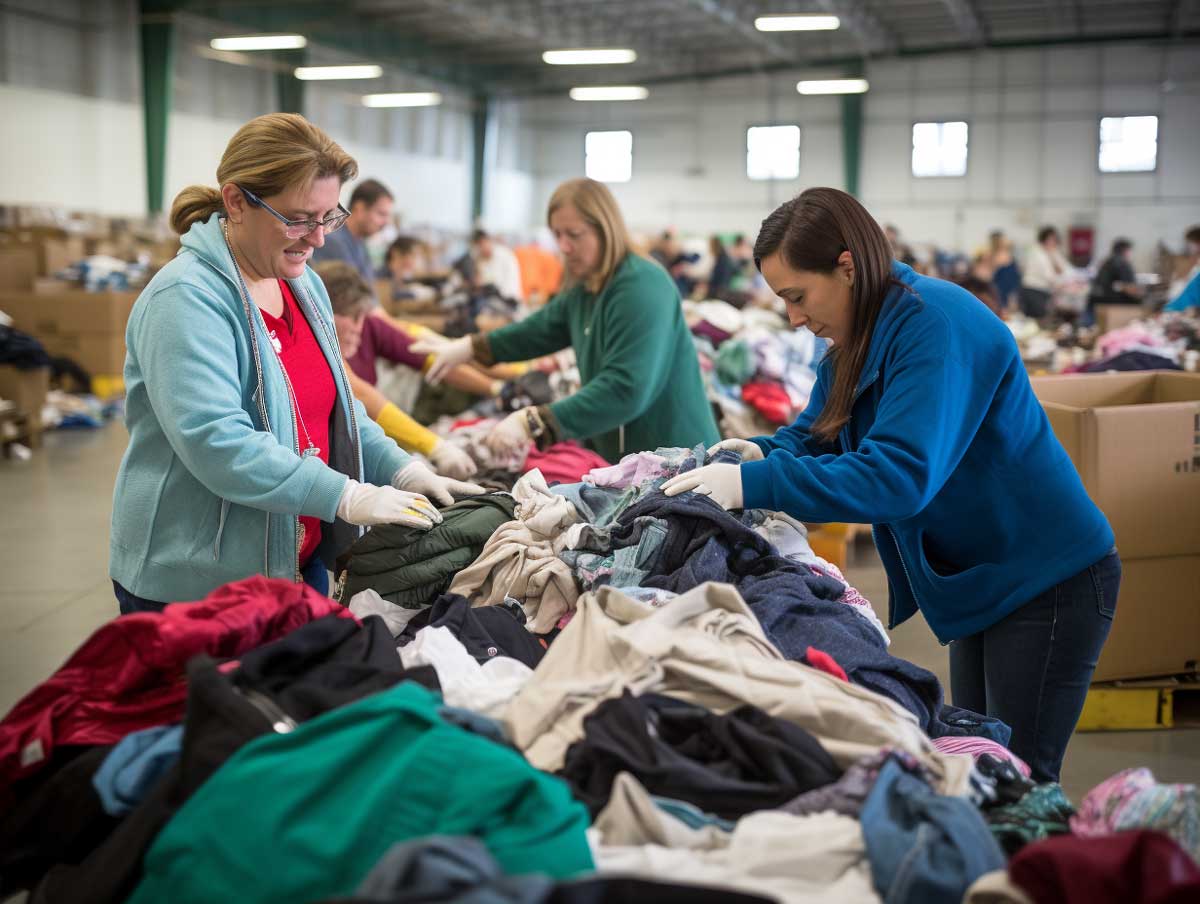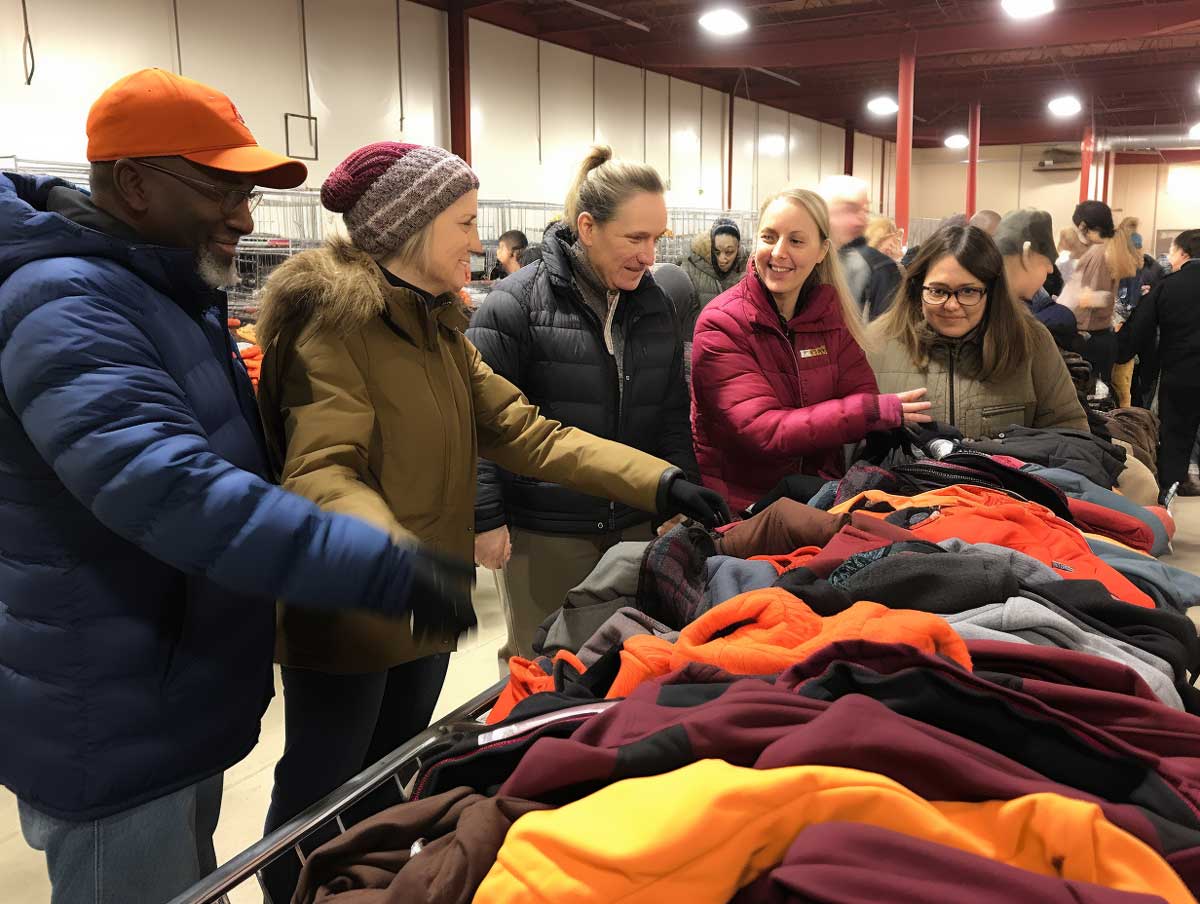Business attire, often termed professional clothing, is crucial for conveying professionalism in corporate settings. Essential for interviews and formal meetings, it includes suits, blazers, and neutral-toned dress shoes.
Details, like polished shoes and minimal jewelry, enhance one's image. Beyond personal use, donating such attire can empower job seekers, underscoring the importance of dressing appropriately and professionally. Read on to learn how you can donate business clothes and empower single mothers and low-income parents trying to support their families.
Benefits of Donating Business Clothes
Donating business clothes may not seem like the most obvious or glamorous form of philanthropy, but it can have a significant impact on individuals and communities. Here are some key benefits of donating business clothes:
-
Boosting Confidence: Dressing professionally can have a profound effect on an individual's confidence. When someone is dressed in a professional and well-groomed manner, they not only look good but also feel good about themselves. Donating business clothes allows individuals who may not have the means to afford professional attire to dress the part for job interviews, presentations, and important meetings. By providing these individuals with the opportunity to dress professionally, donors are directly contributing to their confidence and self-esteem.
-
Enhancing Job Opportunities: As the saying goes, "Dress for the job you want, not the job you have." This rings particularly true for individuals currently unemployed or seeking new employment. In many industries, appearance, and presentation are crucial in the hiring process. By donating business clothes, individuals can make a significant impact on someone's ability to secure a job. It can be the difference between a candidate blending in with the crowd or standing out as a professional. Donated business clothes allow individuals to dress appropriately for interviews and presentations, potentially increasing their chances of landing their desired job.
-
Supporting Low-Income Individuals: Many people living in low-income households struggle to afford even the most necessities, let alone professional attire. Donating business clothes to organizations or charities that support low-income individuals enables these individuals to access clothing they may otherwise not be able to afford. By providing them with business clothes, donors are helping to break down barriers to employment and giving these individuals a fighting chance to improve their lives.
-
Environmental Impact: Donating business clothes also has a positive impact on the environment. By giving these clothes a second life, we are reducing the demand for new clothing production and the resources required to manufacture them. The fashion industry is known for its significant environmental footprint, and every effort to reduce clothing waste can make a difference.
-
Encouraging a Culture of Giving: Engaging in charitable acts, such as donating business clothes, is an excellent way to foster a culture of giving within communities. It encourages individuals to think beyond their own needs and consider the well-being of others. By providing professional attire to those in need, we are not only supporting individuals on their journey to employment but also creating a community that works together to lift each other.
Donating business clothes can have a profound impact on individuals and communities. It boosts confidence, enhances job opportunities, supports low-income individuals, has an environmental benefit, and fosters a culture of giving. By donating these clothes, individuals empower others to present themselves professionally, increasing their chances of success in the workplace and beyond.
Professional Clothing Options
Regarding professional attire, having the right clothing options can make a world of difference. Whether you're preparing for a job interview, an important meeting or just want to exude confidence in the workplace, choosing the right professional clothing can help you make a lasting impression. Let's explore some key options you should consider when dressing for success.
-
Dress Shirts and Blouses: A well-fitted dress shirt or blouse is a cornerstone of professional attire. Opt for classic colors like white, blue, or subtle patterns that convey professionalism. Pair them with tailored pants or skirts for a polished look. Remember, quality fabrics and attention to detail can make all the difference in how you present yourself to others.
-
Tailored Pants and Skirts: It's essential to have a few pairs of tailored pants or skirts in your professional wardrobe. Opt for classic cuts and colors that can be easily mixed and matched with various tops. Choose high-quality fabrics that will last and ensure a comfortable fit. A well-fitted pair of pants or a skirt can enhance your confidence and professionalism in the workplace.
-
Blazers and Jackets: Adding a blazer or jacket to your outfit instantly elevates your professional look. Opt for neutral colors like black, navy, or gray, as they are versatile and can be paired with various outfits. A well-tailored blazer not only provides a polished appearance but also adds a layer of sophistication to your overall style.
-
Dress Shoes: Your choice of footwear can make or break your professional look. Opt for closed-toe dress shoes that are comfortable and complement your outfit. Classic options like loafers, pumps, or oxfords are ideal for a professional setting. Remember to maintain cleanliness and ensure they are in good condition to complete your overall appearance.
-
Accessories: Pay attention to the details when accessorizing your professional attire. A tasteful watch, simple jewelry pieces, and a professional bag or briefcase can enhance your overall look. Remember, less is more, and choosing timeless accessories can add a touch of elegance to your outfit without overshadowing your professionalism.
-
Confidence: Ultimately, the most important aspect of professional clothing options is the confidence it gives you. When you're comfortable and well-dressed, you exude confidence that is often noticed by others. Dressing professionally not only impacts how others perceive you but also boosts your self-assurance, allowing you to perform at your best in any professional setting.
Having the right professional clothing options is crucial for both men and women. Dressing for success not only leaves a positive impression on others but also boosts your confidence and self-esteem. Remember to invest in high-quality, well-fitted pieces that can be mixed and matched to create a variety of professional looks. By choosing the right professional attire, you'll be well-prepared for any professional situation that comes your way.
Dress Pants:
-
Essential for professional attire.
-
Ensure a tailored, comfortable fit.
-
Materials: wool (durable) to cotton (lightweight).
-
Styles: straight leg to wide-leg.
-
Colors: mainly neutral; diversify with grays or pinstripes.
-
Care: occasional dry cleaning recommended.
Dress Shoes:
-
Completes professional looks.
-
Emphasize comfort for long hours.
-
Styles: classic oxfords to versatile loafers.
-
Dominant colors: black and brown; try navy or burgundy for a twist.
-
Maintenance: regular cleaning extends lifespan.
Polo Shirts:
-
Collared, buttoned design; sophisticated t-shirt alternative.
-
Pairs well with casual or formal bottoms.
-
Color options: solid for timelessness, stripes or patterns for flair.
-
Fits: slim to relaxed for silhouette enhancement.
-
Care: generally low-maintenance; check labels.
Blazers/Suits:
-
Embody professionalism.
-
Focus on fit for best appearance.
-
Timeless colors: navy, charcoal; for variety try blues or pinstripes.
-
Suit types: standard two-piece or elegant three-piece.
-
Investment-worthy due to timeless appeal.
-
Care: occasional dry cleaning.
Accessories:
-
Elevate and enhance outfits.
-
Jewelry: from subtle necklaces to bold earrings.
-
Handbags: merge style with functionality.
-
Belts: shape and define.
-
Scarves: add warmth and elegance.
-
Hats: for protection and style.
Donation Opportunities and Resources
In today's dynamic world, professional attire is vital for job seekers, but many can't afford it. Donating business clothing to organizations aids those from low-income backgrounds. Ensure donations include diverse sizes of office-appropriate attire. Understand donation protocols and consider online contributions or community drives. Beyond clothing, some venues offer resume support. Help boost employment chances by decluttering your wardrobe.
Homeless Shelters and Charities
Homeless shelters and charities offer crucial refuge to the vulnerable, providing essentials and addressing underlying causes like addiction and unemployment. They collaborate with community services, aiding diverse groups like families and veterans. Support through donations or volunteering is vital. By aiding these organizations, we cultivate a compassionate community, helping the homeless regain stability.
Online Donations and Clothing Drives
In the digital era, online platforms simplify supporting the needy, allowing contributions to charities globally or locally. Donating attire, especially less common sizes, aids job-seekers, with many sites offering tax receipts. Sharing on social media amplifies impact. Digital giving empowers widespread assistance to the homeless, making charitable actions more accessible and impactful.
Clothing Donation Bins and Appointments
Clothing donation bins in shopping centers enable easy, spontaneous contributions, while appointment-based systems foster a direct connection with charities. Both methods prioritize sustainability, diverting clothes from landfills and benefiting the community. When decluttering, choose either approach to make a meaningful impact with your unwanted items.
Employment Programs for Low-Income Men
In today's job market, low-income men grapple with challenges like limited education. Employment programs help by offering skill development and local job placements. These initiatives also address housing, transportation, and healthcare needs, with ongoing mentorship. These programs benefit both individuals and communities, aiding men in achieving stability and escaping poverty.
Tax Receipts for Donated Items
When donating items like business clothes to charities, it's crucial to obtain a tax receipt. This receipt confirms your donation and its value, aiding in tax deductions. Typically detailing the organization's information, donation date, item descriptions, and their estimated value, this document can reduce taxable income when filing returns. As tax laws differ by region, it's wise to consult a tax professional or familiarize yourself with local guidelines.
To ensure that your tax receipt is valid and accepted by tax authorities, it's important to follow certain guidelines when donating. These may include:
Choose a qualified charitable organization
To be eligible for a tax deduction, your donation must be made to a qualified nonprofit or charitable organization recognized by the tax authorities in your jurisdiction. It's advisable to research and confirm the organization's status before making your donation.
Document your donation
Keep a detailed record of the items you are donating, including their description, quantity, and estimated value. Taking photographs or creating an inventory list can be helpful in case of an audit or if the tax authorities request further documentation.
Obtain a written acknowledgment
Request a tax receipt from the organization at the time of donation. This acknowledgment should contain the necessary information, as mentioned earlier, to accurately claim your deduction.
Maintain supporting documentation
In addition to the tax receipt, it's important to keep supporting documents, such as receipts, invoices, or proof of payment, that show the purchase price or value of the donated items. This evidence can help substantiate your deduction claims if necessary.
Consult with a tax professional
If you have any concerns or questions regarding tax deductions for donated items, seek advice from a qualified tax professional. They can provide guidance specific to your situation and ensure you maximize your deduction while complying with all relevant tax laws.
Donating business clothes to organizations that assist individuals in need is a wonderful way to give back to your community. By obtaining a tax receipt for your contribution, you not only support those in need but also potentially receive a tax benefit. Remember to always consult with a tax professional to ensure that you are following the appropriate guidelines and regulations for tax deductions in your jurisdiction.
Comprehensive List of Items Needed by Organizations
When it comes to donating to organizations, it's important to know what items they truly need. While many organizations may accept a wide range of donations, some have specific needs that can make a significant impact on the people they serve. To help guide your generosity, here is a comprehensive list of items that organizations often need:
-
Clothing: Clean and gently used clothing, particularly professional attire, is always in high demand. This includes dress pants, shirts, blouses, skirts, dresses, and jackets. Additionally, organizations may also require essentials like socks, underwear, and shoes.
-
Household items: Many organizations help individuals and families transitioning out of homelessness or struggling to make ends meet. Items such as bedding, towels, kitchenware, and small appliances can greatly assist in creating a stable and comfortable living environment.
-
Toiletries and personal care items: Products like shampoo, conditioner, soap, toothpaste, toothbrushes, feminine hygiene products, diapers, and baby wipes are essential for maintaining personal hygiene and wellness.
-
Food and non-perishable items: Canned goods, boxed meals, pasta, rice, cooking oil, and other non-perishable items are always appreciated by organizations operating food pantries or soup kitchens.
-
School supplies: Education is key to breaking the cycle of poverty. Donations of backpacks, notebooks, pencils, pens, calculators, rulers, and other school supplies can support children and adults in their pursuit of knowledge.
-
Baby supplies: Organizations assisting low-income families or expectant mothers often require donations of baby formula, diapers, wipes, bottles, and baby clothing.
-
Hygiene kits: Put together hygiene kits containing items like toothbrushes, toothpaste, soap, shampoo, and other personal care items. These kits are invaluable for organizations working with individuals facing homelessness or difficult circumstances.
-
Medical supplies: Some organizations provide healthcare services to underserved populations. Donations of medical supplies such as bandages, gloves, masks, thermometers, and over-the-counter medications can make a difference in the lives of those without access to healthcare.
-
Toys and books: Brightening a child's day with a toy or engaging their minds with books can bring joy and promote intellectual development. Donations of new or gently used toys and books are always appreciated.
-
Monetary contributions: While donations of physical items are valuable, monetary contributions can be even more impactful. Cash donations allow organizations to allocate funds where they are most needed, whether it's for operational costs, program development, or purchasing specific items that may be lacking.
Some organizations may have restrictions on certain items or may not accept donations of used items due to health and safety regulations. By consulting with the organization directly and referring to this comprehensive list, you can donate items that will truly have a positive impact on those in need.
FAQs
1. What is a tax receipt for donations?
A tax receipt is an official document from charities confirming your donation and its estimated value, which can aid in claiming tax deductions.
2. Do all charities provide tax receipts?
Not all. It's essential to check with the organization beforehand. Most registered charities provide receipts, but some smaller groups might not.
3. How is the value of donated items determined?
The value is typically based on the item's fair market value, considering its condition and quality at the time of donation.
4. Can I claim a tax deduction without a receipt?
Most jurisdictions require a tax receipt for claiming deductions. It's always best to keep organized records and consult a tax professional.
5. When should I expect to receive my tax receipt?
It varies by organization, but many provide receipts immediately upon donation or send them within the tax year's end. Always inquire when donating.
Conclusion
In donating items to charities, obtaining a tax receipt is invaluable. This document not only verifies your generous contribution but also aids in maximizing tax deductions. As tax laws differ globally, always consult with a tax professional to ensure accurate claims. Through organized record-keeping, donors can both aid others and benefit from their charitable actions.
Thinking about paying off your debt? Learn more about
grants to help you pay off your debt from our blogs at Gov Relations.While donating business clothes can make a significant difference for job seekers, many families still need everyday wear. Uncover the free clothes program for low-income families in our latest blog post and discover another vital way to support those in need.







